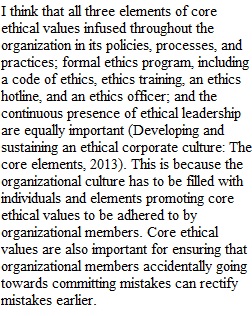


Q Read the three articles assigned in eReserves for this week. The link is Library eReserves. All three articles are in the "Ethical Leadership" folder. Think about the three elements of an ethical organizational culture outlined in the article, "Developing and Sustaining an Ethical Culture" by Mark Schwartz. In the first paragraph of your post articulate your understanding of how the three elements are interrelated, and address the following: Do you think all three elements are equally important? If not, which do you believe is the most important and why? Ethical leadership is one of the key elements of an organization's ethical culture. The article, "Moral Person and Moral Manager" by Trevino, Hartman and Brown goes into depth about the qualities and actions an ethical leader must display. In the second paragraph of your post think about an organization you work for now or have in the recent past and address the following: 1) Did it have an ethical or unethical culture?; 2) Which category of the Moral Person/Moral Manager framework (Figure 2 on p. 137 of the Trevino et al. article) does the leader of the organization display; and 3) What impact does this category have on the overall ethical culture of the organization? The Maak and Pless article, "Responsible Leadership in a Stakeholder Society - A Relational Perspective", is perhaps your most challenging for this week, as it is based on extensive research and transforms ethical leadership to another level of "responsible leadership", embedded in all the different stakeholder groups which organizational leaders now often interact with. Read the background and study Figure 1 on page 107. Think through the various stakeholder groups and the various roles Maak and Pless identify and respond to 3 questions: 1) Which stakeholder group or groups, in your experience, can be the most impactful on whether a leader acts responsibly? and 2) Which role or roles (visionary, steward, citizen, servant, coach, architect, change agent and storyteller) have you seen a CEO or boss of yours do well; give a specific example to illustrate; and 3) Which of these roles do you feel confident playing and which do you think you need more developmental training? Your combined first post (all three paragraphs fully proofread and in professional language) is due to Discussion Forum 1 by Friday night (9/4). This first post is worth 20 grading points (see rubric for evaluation criteria). You must submit your post prior to seeing others' posts. You are required to respond to the first posts of two of your student colleagues. In these posts, you are challenged to extend the thinking of your colleagues. So read carefully what others in the course have posted and don't simply agree or disagree with what they say, probe new perspectives they may not have thought of given your understanding of the readings! Each of the 2 response posts are worth 5 grading points and are due by the end of Week 1 (9/6) of the course. Review the grading rubric for evaluation criteria for response posts. TIP: These response posts sound "easy" but students in this class often lose points on them as they do not give them enough thought! Your "Additional Resources" module gives examples of good response points (ones that received full credit!). Read these samples and make sure your posts capture the level of depth displayed.
View Related Questions